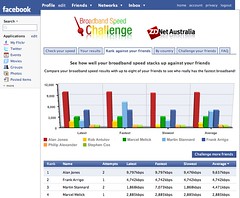
Facebook audience harvesting for publications
Originally uploaded by thatjonesboy.
The Facebook platform is an extraordinary venue for reaching out to a large online audience and encouraging them to try your own web application. As you'd expect, I've been observing the evolution of Facebook closely, not only as a chance to poke my friends, but to observe a rapid and significant evolution in the way we attract and retain an audience.
In the first wave of Facebook platform apps, solo developers built little fun apps primarily to show off their own coding skills, without much thought given to driving app use or polishing the many bugs. Soon, there were a hundred ways to do more than poke a friend, or rate someone as hot or not.
In wave two, when most obvious Facebook app categories were populated with a few competitors, the more ambitious developers began re-coding their apps to focus on acquisition and retention, to ensure they'd win and then retain number one position in their category. But they were still apps that, for the most part, existed only on Facebook. They didn't try to leverage the platform to build their own audience. And they weren't any more commercial than the typical widget; they certainly weren't selling ad space.
In wave three, other major web applications such as Flickr, Twitter and Last.fm launched Facebook-specific apps tying their service to Facebook's user database, allowing consumers using both platforms to stay engaged with, say, Twitter, while Facebook was their front-most application. This was smart because the Facebook platform doesn't threaten the ownership of user data - if you unhook from Facebook later, you can take your users with you. There are more benefits than risks in building and deploying a Facebook version of your web app.
An online media business gets another UB, some more pageviews, some additional ad impressions. All from the most unlikely of sources... a Facebook app.
Here's a new wave that I've only just discovered: an online media business (in this case, ZDnet.com.au) building a Facebook app to try and gain some viral growth in their online audience by giving Facebook users something fun and engaging to try.
Initially, the Broadband Speed Challenge application does what many similar apps do - test your internet connection and give you a whizzo dashboard of animated dials to display just how fast your up- and downloads are.
This must have demanded some outside-the-square thinking at ZDnet - a media business used to writing up news and then selling ads on it - checking people's connection speed is not a core competency. But it's clever, it's useful, and it has relevancy, as you'll see in a minute.
BSC then goes further by allowing you to compare your net connection speed with your friends on Facebook, and invite your other Facebook friends to try the test for themselves. It's cool because it's something no other speed test application could do for you, since most speed test apps have a regular monthly audience of zip/zero/nada.
I was ever-so-slightly-stoked to learn that I had the fastest connection amongst the six friends who'd tried it so far. In yo face, suckas ;-)
i 8wn u suckas!
Then the app goes one smart step further and shows you some wifi/broadband feed headlines from ZDNet. Now, I haven't been a fan of ZDnet. I was a regular reader 3-4 years ago, but then I felt it headed downhill, and I haven't read it since. Until tonight, that is. I've learned the writing's improved, the research is better, the writers are more experienced, so I've resubscribed.
Would I change anything? Yes, I'd probably test the ubiquitous "invite all your friends to try this app" approach that most Facebook developers try. Yes, it's annoying, but it becomes less-so when every dang app you install tries it on. Note I said "test it", I didn't say "adopt it" - see how much it annoys your own subset of the Facebook audience first. I'd also test increasing the prominence of the ZDNet feeds, and see if that affected adoption, usage, or clickthrus to ZDnet.
In ye olde dayes, online social networks and web apps would shrivel and die without the help of online media businesses to build a brand and acquire an audience. Is this example a sign that maybe the relationship, in some cases, is being turned on its head?
An online media business gets another UB, some more pageviews, some additional ad impressions. All from the most unlikely of sources... a Facebook app. Well, I live and learn.




